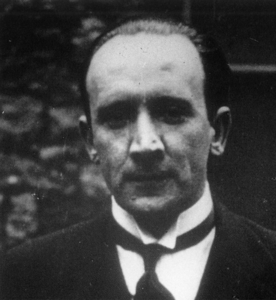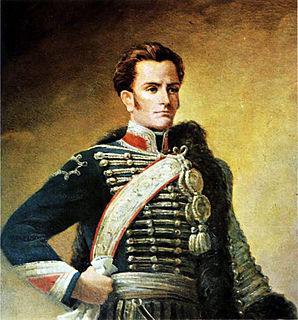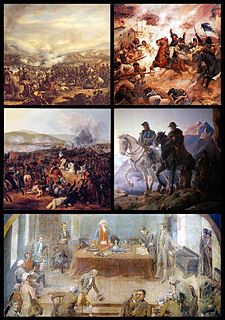
Kevin Christopher O'Higgins was an Irish politician who served as Vice-President of the Executive Council and Minister for Justice from 1922 to 1927, Minister for External Affairs from June 1927 to July 1927 and Minister for Economic Affairs from January 1922 to September 1922. He served as a Teachta Dála (TD) from 1921 to 1927. He was a Member of Parliament (MP) for Queen's County from 1918 to 1921.

José Miguel Carrera Verdugo was a Chilean general, member of the prominent Carrera family, and considered one of the founders of independent Chile. Carrera was the most important leader of the Chilean War of Independence during the period of the Patria Vieja. After the Spanish Reconquista ("Reconquest"), he continued campaigning from exile. His opposition to the leaders of independent Argentina and Chile San Martin and O'Higgins respectively made him to live in exile in Montevideo. From Montevideo Carrera traveled to Argentina where he joined the struggle against the unitarians. Carreras' small army was eventually left isolated in the Province of Buenos Aires from the other federalist forces. In this difficult situation Carrera decided to cross to native-controlled lands all the way to Chile to once for all overthrow Chilean Supreme Director O'Higgins. His passage to Chile, which was his ultimate goal, was opposed by Argentine politicians and he engaged together with indigenous tribes, among the Ranquels, in a campaign against the southern provinces of Argentina. After the downfall of Carreras' ally, the Republic of Entre Ríos, and several victories against the United Provinces of the Río de la Plata Carrera's men were finally defeated by numerically superior forces near Mendoza. Carrera was then betrayed by one of his Argentine helpers, leading to his capture and execution in that city. José Miguel Carrera was of Basque descent.

Michael Daniel Higgins is an Irish politician who has served as the President of Ireland since November 2011.

Ramón Freire Serrano was a Chilean political figure. He was head of state on several occasions, and enjoyed a numerous following until the War of the Confederation. Ramón Freire was one of the principal leaders of the liberal Pipiolo movement. He has been praised by historian Gabriel Salazar as the most democratic leader of the early republican period in Chile.

Rancagua is a city and commune in central Chile and part of the Rancagua conurbation. It is the capital of the Cachapoal Province and of the O'Higgins Region, located 87 km (54 mi) south of the national capital of Santiago.

The Battle of Rancagua also known as the Disaster of Rancagua occurred on October 1, 1814, to October 2, 1814, when the Spanish Army under the command of Mariano Osorio defeated the rebel Chilean forces led by Bernardo O’Higgins. This put an end to the Chilean Patria Vieja and it was the beginning of the Spanish Reconquista of South America.

The Chilean War of Independence was a war between pro-independence Chilean criollos seeking political and economic independence from Spain and royalist criollos supporting continued allegiance to the Captaincy General of Chile and membership of the Spanish Empire.

The lake known as O'Higgins in Chile and San Martín in Argentina is located around coordinates 48°50′S72°36′W in Patagonia, between the Aysén del General Carlos Ibáñez del Campo Region and the Santa Cruz Province.

The Crossing of the Andes was one of the most important feats in the Argentine and Chilean wars of independence, in which a combined army of Argentine soldiers and Chilean exiles invaded Chile leading to Chile's liberation from Spanish rule. The crossing of the Andes was a major step in the strategy devised by José de San Martín to defeat the royalist forces at their stronghold of Lima, Viceroyalty of Perú, and secure the Spanish American independence movements.

Richard "Dick" Barrett was a prominent Irish Republican Army volunteer who fought in the War of Independence and on the Anti-Treaty side in the Irish Civil War during which he was captured and later executed on 8 December 1922.

Brian O'Higgins, also known as Brian na Banban, was an Irish revolutionary, poet, Gaelic revivalist, Sinn Féin politician and a founding member of the organisation. He was President of Sinn Féin from 1931 to 1933.

The Chilean Declaration of Independence is a document declaring the independence of Chile from the Spanish Empire. It was drafted in January 1818 and approved by Supreme Director Bernardo O'Higgins on 12 February 1818 at Talca, despite being dated in Concepción on 1 January 1818. The ceremony of independence was performed on 12 February 1818, the first anniversary of the Battle of Chacabuco.
The battle of Membrillar occurred on 20 March 1814, during the War of Chilean Independence.

Patria Nueva was a period in the history of Chile that began with the victory of Ejército de los Andes in the Battle of Chacabuco on 12 February 1817 and ended with the resignation of Bernardo O'Higgins as Supreme Director in 1823.

Clarence House, Richmond is a Grade II listed house in The Vineyard, Richmond, dating from about 1696.

Ambrosio Bernardo O'Higgins, 1st Marquess of Osorno born Ambrose Bernard O'Higgins, was a Spanish colonial administrator and a member of the O'Higgins family. He served the Spanish Empire as captain general of Chile (1788–1796) and viceroy of Peru (1796–1801). Chilean independence leader Bernardo O'Higgins was his son.
The following lists events that happened during 1817 in Chile.

Chile–Ireland relations are foreign relations between Chile and Ireland. Approximately 120,000 Chileans nationals are of Irish origin. Both nations are members of the Organisation for Economic Co-operation and Development.


















